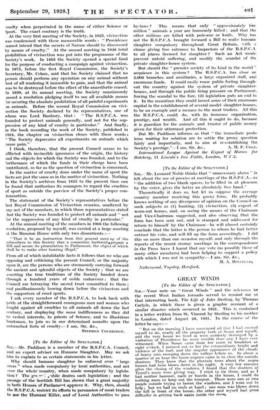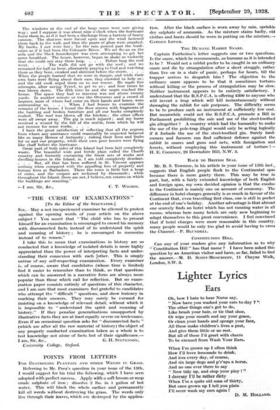GREAT WINDS [To the Editor of the SPECTATOR.] SIR,—Your note
on " Great Winds " and the reference to the recent West Indian tornado served to remind me of that interesting book, The Life of John Sterling, by Thomas Carlyle, in which there is given a graphic account of a similar disaster which occurred in 1831. This is contained
in a letter written from St. Vincent by Sterling to his mother in London, dated August 28, 1831. In the course of the letter he says :-
" But on the morning I have mentioned all that I had exerted myself to do, nearly all the property both of Susan and myself, and the very house we lived in were suddenly destroyed by a. visitation of Providence far more terrible than any I have ever witnessed. When Susan came from her room to breakfast at eight o'clock, I pointed out to her the extraordinary height and violence of the surf, and the singular appearance of the clouds of heavy rain sweeping down the valleys before us: In about a quarter of an hour the house-negroes came in to close the outside shutters. They knew that the plantain trees about the negro- houses had been blown down in the night. A very few minutes after the closing of the windows, I found that the shutters of Tyrrel's room were giving way. I tried to tie them, and as I had neither hammer, nails or boards in the house, I could do- nothing more to keep out the tempest. There were one or two people outside trying to fasten the windows, and I went out to help ; but we had no tools at hand ; one man was blown down the hill in front of the house,• the other and myself had great difficulty in getting back again inside the demi.
The windows at the end of the large room were now giving way ; and I suppose it was about nine o'clock when the hurricane
burst them in, as if it had been a discharge from a battery of heavy cannon. The shutters were forced open and the wind fastened them back to the wall, and then the panes of glass' were smashed.
My books, I saw were lost ; for the rain poured past the book- cases as if it had been the Colenarie River. We set Swan on the sofa and the black housekeeper was even attempting to get her some breakfast. The house, however, began to shake so violently that she could not'stay there long. . . . Before long the roof went. . . . The walls did not go with the roof ; and we remained for half an hour, alternately praying to God and watching them as they bent, creaked and shivered before the storm. . . . When the people learned that we were in danger, and while their own huts were flying about their ears, they crowded to help us ; and the old cook urged them on to our rescue. He made five attempts, after saving Tyrrel, to get to us ; and four times he was blown down. The fifth time he and the negro reached the house. The space they had to traverse was not above twenty yards. In another minute or two the Overseers and a crowd of negroes, most of whom had come on their hands and knees, were surrounding us. . . . When I had leisure to examine the remains of the house. I found the floor strewn with fragments of the building and broken furniture and all our books completely soaked. The roof was blown off the kitchen the other offices were all swept away. The gig is much injured ; and my horse received a wound by the fall of the stable, from which he will not recover for some weeks. . . .
I have the great satisfaction of reflecting that all the negroes from whom any assistance could reasonably be expected behaved like so many Heroes of Antiquity ; risking their lives and limbs for us and our property, while their own poor houses were flying like chaff before the hurricane.
Great part of both sides of this Island had been laid completely waste. The beautiful wide and fertile plain called the Charib country and formerly containing the finest sets of works and dwelling-houses in the Island, is, I am told completely desolate. . . . But, all that has been suffered in St. Vincent appears nothing when compared with the appalling loss of property and human lives at -Barbadoes. There the town is little but a heap of ruins,. and the corpses are reckoned by thousands ; while throughout the Island, there are not, I believe, ten estates on which the buildings are standing."





































 Previous page
Previous page